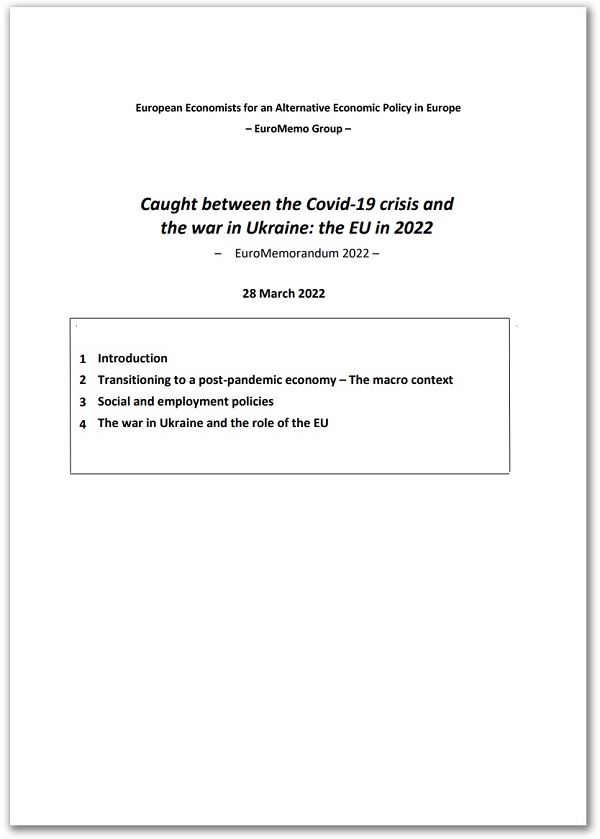This year’s EuroMemorandum focuses not only on EU´s failure in seeking multilateral cooperation for the Covid-19 pandemic. Russia’s invasion of Ukraine also marks a dramatic turning point for the international system itself and in particular for the political and economic development of the EU. What is the right approach to these issues?
The Covid-19 pandemic defined the year 2021, as it did the previous year. The world has already been through three major Covid-19 infection waves, and at the time of writing this year’s EuroMemorandum, a fourth infection wave caused by the new Omicron variant with recently discovered subvariants is raging through Europe. Covid-19 has had a profound impact on global living conditions and the European economy. While EU GDP contracted by 5.9% in 2020, in 2021 the macroeconomic context improved somewhat with all member states returning to positive GDP growth rates. Nevertheless, employment and real wages lagged behind the developments in output. Unemployment peaked at 8.6% in September 2020, up from 7.4% in September 2019, but started a downward trend since then. While the widespread use of job retention schemes and similar measures had a dampening effect on unemployment, the resulting income losses were nevertheless significant. In 2020, the loss of median employment income at EU level was estimated at -7.2%, with large variations among countries and unequal effects on vulnerable groups. This finding confirms the general pattern that the pandemic has hit different regions and sectors with varying force, creating or intensifying existing divergences across the EU.
The EU has failed dramatically in seeking multilateral cooperation for the Covid-19 pandemic. Leading industrialized states, including the EU, have instead prioritized supplying their own populations with vaccines. The EUR 1 billion EU support announced by Ursula von der Leyen in June 2021 to build vaccine production capacity in Africa is largely symbolic. The failure of effective multilateral cooperation is not limited to the Corona pandemic, however, but extends to other key areas, not least the all-important climate issue. The Conference of the Parties to the Framework Convention on Climate Change (COP 26 from October 31 to November 11, 2021 in Glasgow) produced modest results. The latest IPPC report, published at the end of February 2022 stresses that, should countries not significantly scale up their measures to fight the climate crisis within the next few years, it will be impossible to meet the key target of limiting global warming to 1.5° Celsius by 2100. What is more, greenwashing of important measures such as the recent European Commission (EC) proposal to classify natural gas and nuclear energy as green bridging technologies, is threatening to impair any substantial progress.
Russia’s invasion of Ukraine, which started on February 24 2022, marks a dramatic turning point for the international system itself and in particular for the political and economic development of the EU. The harsh economic sanctions imposed upon Russia, as well as the massive military support by the US, the EU and others extended to Ukraine might appear justified by the Russian government’s flagrant breach of international law. Nevertheless, these measures might contribute to an escalation of the war and exacerbate the risk of an all-out military conflict involving NATO countries. To avoid such a scenario from materializing, it is urgent to reconsider the approach to sanctions and, above all, to intensify diplomatic efforts to de-escalate the conflict.
More generally, the EU should rethink its strategic orientation and resist the impetus for rearmament and militarization. Against a constellation of multiple crises and the climate emergency, the EU and indeed the international community at large, need to focus its political and economic capital on promoting effective international cooperation and peace-building.
More than 100 economists and social scientists from all over Europe and beyond have declared their support for the new EuroMemorandum (click here for the list of signatories).
Find the EuroMemo for download on the left/below (mobile version) in ‚Documents‘ (English, PDF).
The EuroMemorandum 2022 is also available in:
German: Zwischen Coronakrise und Ukraine-Krieg: Die EU im Jahr 2022
Summaries of the EuroMemorandum are also available in:
French: Prise entre la crise du Covid-19 et la guerre en Ukraine: l’UE en 2022
Greek: Παγιδευμένη ανάμεσα στην covid-19 και στον πόλεμο στην Ουκρανία: η ΕΕ το 2022
Polish: Kryzys Covid-19 i wojna w Ukrainie: UE w 2022 r. między młotem a kowadłem
German: Gefangen zwischen der Covid-19 Krise und dem Krieg in der Ukraine: die EU im Jahr 2022
Italian: Tra Covid-19 e guerra in Ucraina: l’Unione Europea nel 2022
Table of Content
- Introduction
- Transitioning to a post-pandemic economy – The macro context
- Social and employment policies
- The war in Ukraine and the role of the EU
For further reading:
